Photographs: Paresh Gandhi. Suman Guha Mozumder in New York
"We have decided to build 20 km of roads every day and then take it to 7,000 km a year. Therefore, if we lose more days (in terms of putting foreign investment in place), it will be a great loss," Union Minister of Surface Transport Kamal Nath told a gathering of 100-odd potential investors and entrepreneurs at the Indian Consulate in New York on Tuesday.
He said the government will complete the process of changing some of the rules and regulations relating to investment in the road sector by the end of this month to make it more attractive for financiers.
"Therefore by the end of the month -- that is, in exactly another 15 days -- we would have removed all the issuesirritants and resolved the concerns of prospective investors," Nath said in response to a question by rediff.com.
Nath is in the United States for a week, capping off a world roadshow to revive interest in foreign investment in India's massive infrastructure development, particularly, roads and highways.
India's road network of 3.32 million (33.2 lakh) km is second only to the US and needs drastic overhaul.
Kamal Nath on what dogs Indian road projects
Asked to spell out the concerns of prospective investors, Nath said that foreign investors are particularly worried about the termination and exit clauses.
"We have concession agreements, contracts and bid documents, but wherever we went (be it London or Singapore) for the roadshow, there were certain concerns on the part of investors and contractors, who felt that the investment made was being eroded by those conditions," he said.
For example, he said, there is a 'termination clause' in the investment modality in the road sector under which the government can tell the investor that it will refund his investment and call it a day.
He, however, clarified that in reality the termination clause is not meant to be a termination clause, but user safety clause.
"But whenever an investor looks at this clause he says 'this is not the thing I want to get involved with'," Nath added.
He said the government would remove all such irritants and dampers, including the exit clause.
Stating that road building is a challenging task in India for various reasons, Nath said there is no 'one size fits all' formula because building a road in Bihar or building a road in the northeast or in Kashmir is very different from building a road in Punjab and Haryana.
"We have to move on and there are dynamic issues that will constantly come up which we have resolved to address," he said.
Kamal Nath on what dogs Indian road projects
Image: Kamal Nath being ushered into the conference hall of the Indian Consulate in New York.Photographs: Paresh Gandhi
In a brief interview with rediff.com, Nath said that some of the most important challenges as far road construction is concerned are:
- Capacity building;
- The ability to build structural strength needed to create and manage 20,000 kilometers of road building work in progress;
- Capacity building of consulting engineers and contractors; and
- Land acquisition.
"I have talked to the chief ministers for land acquisition that is supervised and tackled at the highest levels," he added.
Asked whether the state governments would be willing to acquire land for road given that Railway Minister Mamata Banerjee has come out with a model where the government will buy land directly from landowners, Nath said that model is for industry where a large chunk of land is required.
"For roads it is linear -- it is 20 meters here and 20 meters there. So land acquisition is not a combative issue. People are happy to give their land because the value of the rest of their land goes up. What Banerjee is talking about is for large industries," he explained.
Kamal Nath on what dogs Indian road projects
Nath, who met prospective investors during a meeting hosted by US India Business Council in New York on Monday and is also expected to meet investors during a two-day meeting hosted by Institutional Investors beginning September 17, said that the response to the roadshow has been very good. A lot of new contracting companies, individuals as well as consulting engineers, with new technologies have shown interest.
The USIBC, in partnership with the Confederation of Indian Industry, hosted the minister for what it called an 'intimate roundtable' -- focussing US investment in India's roads and highways.
Speaking to USIBC's premier engineering, construction and investment firms, Nath said this is one of the most important projects the Indian government has ever undertaken.
"Roads and highways cross the country and touch every facet of life, as well as provide vital connectivity for trade and commerce," he said.
India is set to launch the world's biggest public private partnership program that will result in the development of 15,000 km of roads and highways over the next three years at a cost of $70 billion.
The current Five-year Plan calls for $500 billion to upgrade India's infrastructure sector -- with about one-third of the investment coming from the private sector.
Kamal Nath on what dogs Indian road projects
Image: Potential investors listen to Kamal Nath's speech.Photographs: Paresh Gandhi
The 2009- 2010 Union Budget announced a 23 per cent increase in India's highway budget, lifting it to $4 billion. Nath has presented detailed plans for increasing the pace of road building, up from 2kms a day to 20kms a day.
The plans -- with timelines for land acquisition, feasibility studies, bidding and building -- envision construction of 127 roads in the coming year, at a cost of $20 billion. Fifty per cent of the projects would be undertaken on a 'Build-Operate-Transfer' basis.
Accompanying Nath was Brijeshwar Singh, chairman of the National Highways Authority of India, which is already inviting bids for 60-70 projects in the current financial year for construction of 7,000-8,000 km of highways and is setting up an Expressway Authority, a first in India.
During the USIBC-CII meeting Nath assured that many of the concerns expressed by potential investors would be ironed out by the end of the month, adding that institutional capacity building, feasibility studies and mega projects would herald a new era of development of infrastructure projects.
"The participants at the meeting were very enthusiastic. You have got to sensitise the investing community about this. We have to ensure that contractors are able to raise funds because if they are not able to finance their own work, we are not going to have the roads," Nath said.

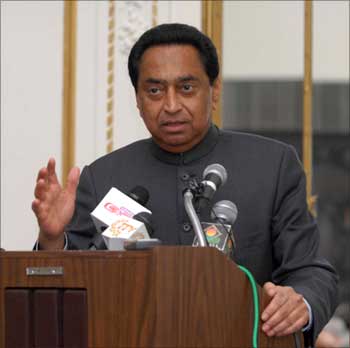
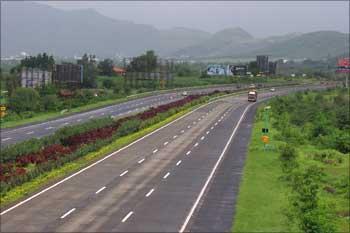
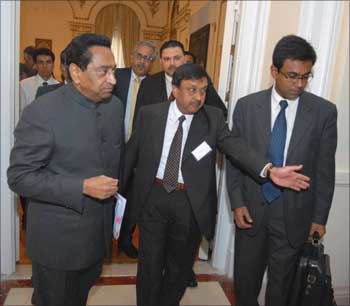
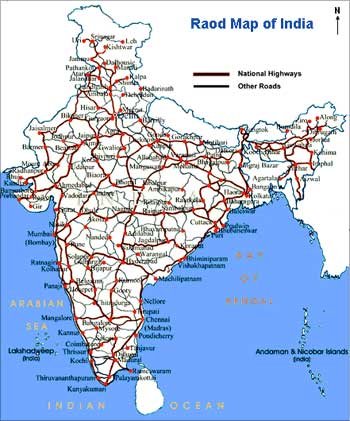
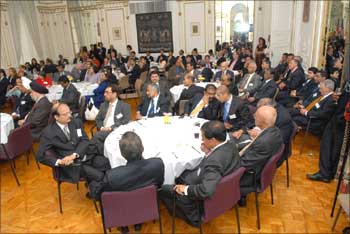
article